
April 28
1810 Birth:Union general who advocated for black troops: Union General Daniel Ullmann is born in Wilmington, Delaware. Ullmann was best known as an advocate for black troops.
1887 Schnaebelé incident:
On April 21, 1887, the French Havas news agency published a dispatch to the effect that Schnaebelé, a mid-level and obscure French police inspector, had been arrested by two agents of the German secret police on the Franco-German frontier near Pagny-sur-Moselle, as he was on his way to Ars-sur-Moselle for a meeting with the German police inspector there, at the latter's request. A dispute followed as to whether the arrest had taken place on French or on German territory . . . but regardless, the French claimed that under the circumstances Schnaebelé was entitled to immunity even if on German territory, since he had been invited to a conference by German officials. The reason given by the German authorities for the arrest was that in a previous inquiry into charges of treasonable practices against a number of Alsatians, evidence had been produced that Schnaebelé was involved in transmitting to Paris information as to German fortresses . . . and that an order had been given to arrest him if ever he should be found on German soil. In other words, the Germans believed Schnaebelé to be a spy.
On April 28, Schnaebelé was released by order of the German Emperor [Wilhelm I]. In a dispatch of the same date to the French ambassador at Berlin, Bismarck explained that, though the German Government considered . . . the arrest to be fully justified, it was deemed expedient to release Schnaebelé on the ground that business meetings between frontier officials "must always be regarded as protected by a mutually assured safe conduct." Thus ended the Schnaebelé incident.
The week-long incident, between April 21 and 28, had such threatening and provocative language from both sides as to cause serious concern of war. A large section of the German press demanded that Germany make no concession. In France, the Cabinet voted 6 to 5 against an ultimatum demanding the release of Schnaebelé with an apology, which would almost certainly have meant war, as . . . happened with the Ems Dispatch in 1870. The proposed ultimatum had been put forward by French war hawk and Minister of War Georges Ernest Boulanger, who also brought in a bill to mobilise an army corps. [For further details, Click here]
1901 Birth: Heinrich "Gestapo" Mueller:

SS Lieutenant-General and Senior Chief of the Gestapo (1939-45) said by many historians to have been directly responsible for carrying out the "Final Solution," Mueller will begin his career in the Bavarian state police, specializing in the surveillance of Communists and making a special study of Soviet police methods. In 1935, even though not a party member, Mueller will be selected by Reinhard Heydrich to become second in command of the Gestapo. Even though highly regarded by both Heydrich and Himmler, he will not join the party until 1939, and will be suspected of being an opportunist by many longtime party members. After 1941, Mueller will be more directly involved in signing the orders sending Jews to the East than any of his superiors, including Himmler and Kaltenbrunner. He will last be seen in Hitler's bunker on this day in 1945 and will disappear shortly thereafter. His whereabouts and fate after the war remain unknown, though there is much speculation that he had defected to the Soviet Union.
1908 Birth: Oskar Schindler:
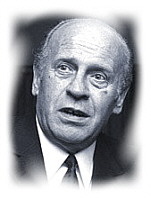
German businessman Oskar Schindler became an unlikely hero when he saved hundreds of Jews in Poland and Czechoslovakia from death at the hands of the Nazis during World War II (1939–45). By employing them in his factory, Schindler protected them from the wrath of the Nazi Party and preserved generations of Jewish families.
Oskar Schindler was born in 1908 in the industrial city of Zwittau, Moravia, then a German province of the Austro-Hungarian Empire and now part of the Czech Republic. The region where Oskar grew up and attended a German-language school was also known as the Sudetenland. Oskar's father, Hans Schindler, was a factory owner and his mother, Louisa Schindler, was a homemaker. Oskar had one younger sister named Elfriede with whom he had a close relationship, despite a seven-year age difference. As a child, Schindler was popular and had many friends, but he was not an exceptional student. Among his childhood playmates were the two sons of a local rabbi.
During the 1920s Schindler worked for his father selling farm equipment. In 1928, however, the young man's marriage to a woman named Emilie caused problems in the relationship between the two men and Schindler left his father's business to work as a sales manager for a Moravian electric company.
Meanwhile, the political landscape in Europe was undergoing major changes, especially in Germany, where Adolf Hitler (1889-1945) and his Nazi Party began their rise to power. Hitler began stirring up ethnic feelings among the Sudeten Germans, pointing out that their "rightful" ties were with Germany, not Czechoslovakia. By 1935 many Sudeten Germans joined the pro-Nazi Sudeten German Party. Schindler joined, too, not out of any love for the Nazis, but because it made business sense to go along with the prevailing wind.
On September 1, 1939, Hitler invaded Poland, prompting Great Britain and France to declare war on Germany. Within a week, Schindler arrived in Krakow, Poland, eager to find a way to profit from the conflict in one way or another. In mid-October, the city became the new seat (central location) of government for all of Nazi-occupied Poland. Schindler quickly created friendships with key officers in both the Wehrmacht (the German army) and the SS (the special armed Nazi unit), offering them black-market (illegal) goods such as cognac and cigars.
It was around this same time that he met Itzhak Stern, a Jewish accountant who would eventually help his relations with the local Jewish business community. Schindler purchased a bankrupt kitchenware factory and opened it in January 1940. Stern was hired on as the bookkeeper and soon developed a close relationship with his employer.
Schindler relied on his legendary flair as well as his willingness to bribe the right people to secure numerous German army contracts for his pots and pans. To staff his factory, he turned to Krakow's Jewish community, which, Stern told him, was a good source of cheap, reliable labor. At the time, some fifty-six thousand Jews lived in the city, most living in ghettos (poor neighborhoods that were traditionally reserved for Jews).
By the spring of 1940, the Nazi crack-down against Jews had begun. Schindler was ordered to pay his Jewish employees' wages directly to the SS rather than to the workers themselves. In August Nazi authorities issued a new regulation ordering all but "work-essential" Jews to leave the city. This sparked the panic that sent Jews scrambling for work that would be considered "essential."
In June of 1942, the Nazis began relocating Krakow's Jews to labor camps. Some of Schindler's workers, including his office manager, were among the first group of people ordered to report to the train station. Schindler raced to the station and argued with an SS officer about how essential his workers were to the war effort. By dropping the names of some of his Nazi friends and making a couple of threats, he was finally able to rescue the workers and escort them safely back to his factory.
In early 1943 the Nazis ordered the final "liquidation" of the Krakow ghetto. The man put in charge of the operation was a young SS officer named Amon Goeth, the commandant of the Plaszow forced labor camp just outside the city. Jews who were healthy and could work were sent to Plaszow and the rest were sent off to death camps or executed on the spot. When Goeth announced that local industries would be moved inside Plaszow, Schindler proposed establishing a labor mini-camp within his factory that would continue to employ his own workers. Goeth agreed after Schindler bribed him.
In early 1944, however, Plaszow's designation was changed from that of a labor camp to a concentration camp. This meant that its prisoners were suddenly marked for transport to death camps such as Auschwitz. Then came word in the summer that the main camp was to be closed as well as Schindler's factory. Schindler approached Goeth about moving his factory and his workers to Czechoslovakia so that they might continue to supply the Third Reich (Hitler's army) with vital war supplies. After another bribe, the SS officer agreed to throw his support behind the plan and told Schindler to draw up a list of those people he wanted to take with him. Schindler was now faced with the task of choosing those he wanted to save—literally a matter of life and death. Schindler came up with a list containing some eleven hundred names, including all the employees of Emalia Camp and a number of others as well.
During the fall of 1944, Schindler made the necessary arrangements (and paid the necessary bribes) to begin the process of moving his factory to the town of Brunnlitz, Czechoslovakia. The liquidation of the Plaszow camp began that October. Shortly after around eight hundred men were shipped out in boxcars bound for Brunnlitz. Three hundred women and children who were supposed to join them there were mistakenly routed to Auschwitz instead. Schindler immediately rescued these women and children, and they were sent on to Brunnlitz.
Over the next seven months, Schindler's factory never produced a single useful shell (the outer casings for bullets). He called it "start-up difficulties" when, in reality, he had purposefully weakened the manufacturing process to make sure that the shells failed quality-control tests.
Finally, on May 8, 1945, the war came to an end after Germany surrendered. Schindler gathered all of his workers together on the factory floor to pass along the good news. He then asked them not to seek revenge for what had been done to them and called for a moment of silence in memory of those who had died. He also thanked the members of the SS who were present and encouraged them to go home peacefully and without further bloodshed.
Fearing capture, Schindler, along with his wife, fled west to avoid Russian troops advancing from the east. He preferred to take his chances with the approaching U.S. forces instead. A couple of days later, the twelve hundred or so Schindlerjuden ("Shindler's Jews") were freed by a lone Russian officer who rode up to the factory on horseback.
Schindler's postwar life was similar to that before the war, which was marked by a string of failed business ventures, overspending, plenty of drinking, and love affairs. In 1949 Schindler moved to Argentina and purchased a farm. By 1957, however, Schindler had gone bankrupt and was relying on the charity of the Jewish organization B'nai B'rith to survive.
In 1958 Schindler abandoned his wife and returned to West Germany. Once again, the Jewish Distribution Committee and several grateful individuals came through for him with money. He started a cement business in Frankfurt, Germany, but it failed in 1961. From then on, he lived mostly off funds provided by the Schindlerjuden as well as a small pension (retirement money) the West German government granted him in 1968.
The same year Schindler lost his cement business, he was invited to visit Israel for the first time. He was delighted with the warm reception he received, which contrasted sharply with his treatment at home. Many of his countrymen were angry with him for saving Jews and testifying in court against Nazi war criminals. Every spring for the rest of his life, he returned to Israel for several weeks to bask in the admiration of the Schindlerjuden and their offspring, whom he regarded with great affection as his own family.
Shortly after Schindler's fifty-fourth birthday in 1962, he was officially declared a "Righteous Gentile (non-Jew)" and invited to plant a tree on the Avenue of the Righteous leading up to Jerusalem's Yad Vashem Museum, a memorial to the Holocaust, the name for the German liquidation of Jews during World War II. Upon his death from heart and liver problems in 1974, he was granted his request to be buried in Israel. About five hundred Schindlerjuden attended his funeral and watched as his body was laid to rest in the Catholic cemetery on Mount Zion in Jerusalem. Thanks to Oskar Schindler, more than six thousand Holocaust survivors and their descendants were alive in the 1990s to tell the remarkable story of "Schindler's List."
1912 Birth: Odette Sansom:--French resistance worker:
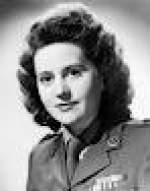
She made a landing near Cannes in 1942, where she made contact with her supervisor, Peter Churchill. Using the code name Lise, she brought him funds and acted as his radio operator. Churchill's operation in France was betrayed by a double agent, and Odette and Churchill were imprisoned. Under torture by the Gestapo at Fresnes prison in Paris, Odette stuck to her cover story that Churchill was the nephew of Prime Minister Winston Churchill, and that she was Peter's wife. The hope was that in this way their treatment would be mitigated. Odette was condemned to death in June 1943 and sent to Ravensbrueck Concentration Camp. She survived the war and testified against the prison guards at a 1946 war crimes trial.
1915 World War I: Various:

List Regiment: Gefreiter Adolf Hitler's 16 Reserve Infantry Regiment [List Regiment] occupy a position, at Fromelles (pictured above in a drawing by Hitler), which is on a level field with water channels, willow trees and willow stalks, in the distance towards the enemy lines lie an insignificant wood with barbed wire entanglements. Under the direction of their defense-minded commander, Lieutenant General Gustav Scanzoni von Lichtenfels, the regiment works ceaselessly day and night in the subsequent weeks, to further fortify their position at Fromelles. [For further details, Click here.]
From the diary of the Chaplain of Gefreiter Adolf Hitler's List Regiment, Father Norbert:
The [welcome] ceremony [for new recruits] made a deep impression on the soldiers, who were very solemn from the funeral preceding the ceremony. Only three days earlier had they said goodbye to their homes; now they were already so close to the serious realities of war . . . . So many tears roll down the faces of the young and also the old, as we have many Landwehr men among our replacements. Deeply shaken, the comrades now receive the General Absolution.
[See: Was Adolf Hitler a 'War Hero' in World War I?]The International Congress of Women convenes on this day in 1915 at The Hague, Netherlands, with more than 1,200 delegates from 12 countries—including Britain, Germany, Austria-Hungary, Italy, Poland, Belgium and the United States—all dedicated to the cause of peace and a resolution of the great international conflict that was World War I. [For further details, Click here]
1916 World War I: Various:
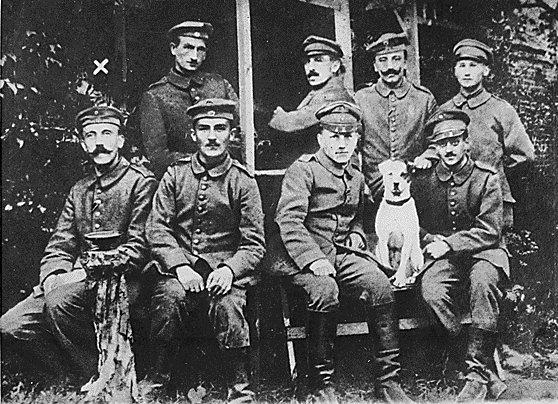
List Regiment: Gefreiter Adolf Hitler endures trench warfare in Flanders (Artois) with 3 Company, 16 Reserve Infantry Regiment. [For further details, Click here.]
Sir Charles Townshend's Communique on the Siege of Kut:
These considerations alone, namely, that I can help my comrades of all ranks to the end, have decided me to overcome my bodily illness and the anguish of mind which I am suffering now, and I have interviewed the Turkish General-in-Chief yesterday, who is full of admiration at "an heroic defence of five months,"' as he puts it. Negotiations are still in progress, but I hope to be able to announce your departure for India, on parole not to serve against the Turks, since the Turkish Commander says he thinks it will be allowed, and has wired to Constantinople to ask for this, and that the Julnar, which is lying with food for us at Magasis now, may be permitted to come to us. Whatever has happened, my comrades, you can only be proud of yourselves. We have done our duty to King and Empire; the whole world knows that we have done our duty. I ask you to stand by me with your steady and splendid discipline, shown throughout, in the next few days for the expedition of all service I demand of you.
For the Austrian Report on the Turkish Siege of Kut click here.
1917 World War I: Various:
List Regiment: Gefreiter Adolf Hitler's 16 Reserve Infantry Regiment, 3 Company, participate in the Arras action, being redeployed east of Vimy Ridge. [For further details, Click here.]
Second Battle of the Aisne and Third Battle of Champagne:
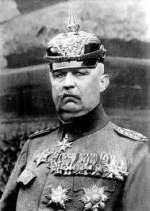
Erich Ludendorff: A very heavy drum fire, which was begun before daybreak over the whole front from Lens as far as Queant, was the prelude to a battle by which the British for the third time hoped to pierce the German lines near Arras. By midday the great battle was decided by a heavy defeat of the British. At dawn, on a front of about thirty kilometres, British storming columns followed curtains of steel, dust, gas, and smoke, which had been advanced by degrees. The weight of the enemy thrust north of the Scarpe was directed against our positions from Acheville as far as Roeux, where the battle raged with extraordinary violence.
1918 World War I: List Regiment: Gefreiter Adolf Hitler's 16th RIR constructs fortified works in difficult defensive positions on an active front with German assault regiments near Fountaine (Montdidier). [For further details, Click here.]
1919 Parachute: The first jump with the Army manually operated army parachute is made by Leslie LeRoy Irvin in Dayton, Ohio. This was the first test of this type, known as the "free parachute," with which the operator jumps before pulling the ripcord. He jumped at an altitude of 1,500-ft from a de Havilland DH-9 biplane while flying at 100-mph over McCook Field, Dayton, Ohio. He broke his ankle upon landing on the ground. Later, he founded the Irving Air Chute, Co., which business name resulted from a spelling error on the incorporation papers.
1920 Azerbaijan is annexed by the Soviet Union.
1933 Holocaust: Germany: FDR's Secretary of State, Cordell Hull, assures representatives of American Jewish organizations that the US State Department will continue to monitor the Jewish situation. (THP) 1939 Various:
Hitler rejects Roosevelt's appeal for peace: In a worldwide radio broadcast from the Reichstag, he denounces what he calls Britain's new foreign policy. He also annuls the German-Polish non-aggression Pact and denounces the British-Polish Pact. [And] I would appreciate it very much if you, Mr. Roosevelt, as one of the successors of the late President Wilson, would use your efforts to seeing that promises, on the basis of which Germany once laid down her arms and placed herself in the hands of the so-called victors, be at last redeemed. I am thinking less of the countless millions extorted from Germany as so-called reparations than of the return of the territories stolen from Germany. Germany lost approximately 3,000,000 square kilometers of territory in and outside Europe although the whole German colonial empire, in contrast to the colonies of other nations, was not acquired by means of war but solely through treaties or purchase. President Wilson solemnly pledged his word that the German colonial claim like all others would receive the same just examination.
Instead of this, however, the German possessions were given to nations who already have the largest colonial empires in history, while our people were subjected to great cares which are now - as they will continue to be in the future - particularly pressing. It would be a noble act if President Franklin Roosevelt were to redeem the promises made by President Woodrow Wilson. This, above all, would be a practical contribution to the moral consolidation of the world and the improvement of its economic conditions. Mr. Roosevelt also stated in conclusion that the heads of all great governments are in this hour responsible for the fate of humanity and that they cannot fail to hear the prayers of their peoples to be protected from the foreseeable chaos of war. And I, too, would be held accountable for this. Mr. Roosevelt, I fully understand that the vastness of your nation and the immense wealth of your country allows you to feel responsible for the history of the whole world and for the fate of all peoples. My sphere, Mr. President, is considerably smaller and more modest.
Holocaust: Czechoslovakia: Sudeten-German Nazis incite anti-Jewish riots in Jihlava (Iglau),. Many Jewish shops and stores are damaged. (THP)
1942 Various:
Holocaust: Several hundred Jews are shot at Przemysl, about 150 miles east of Auschwitz. (THP)
World War II: As a result of a Gallup Poll, it is decided that the war will be called World War ll.
1943 Various:
World War II: An International commission visits Katyn: [In] the months of March and April 1940 large railway transports of Polish officers were unloaded almost daily at the Gniesdowa railway station near Katyn. The officers were then transported to the Katyn forest by trucks and were never seen again. The commission also took further notice of previous discoveries and determinations and examined the recovered evidence. By 30 April 1943, 982 corpses had been exhumed. Of those, about 70% were immediately identified while the papers of the others will be utilized for identification only after a careful pretreatment. The corpses that were dug up prior to the arrival of the Commission were viewed as a group and autopsies were performed by Professor Buhtz and his co-workers on the majority of them. Seven mass graves were opened up of which the largest contained an estimated 2,500 bodies. The members of the Commission personally performed autopsies on nine corpses while many specially chosen corpses were submitted to a coroner's inquest. The cause of death of all the exhumed corpses is without exception a shot in the head. [For further details, Click here.]
Holocaust: Warsaw ghetto: From the SS and Police Fuehrer in the District of Warsaw to the Higher SS and Police Fuehrer East: Today, 10 raiding parties were formed for combing out the whole of the Ghetto. These raiding parties again discovered proceeding step by step, a number of dug-outs, which were found to have been prepared as far ago as the middle of last year for use in the resistance of the Jews. A total of 335 Jews were forcibly pulled out of these dug-outs. Apart from these operations, we continued to cleanse the resistance center used by the Jewish military organization, situated at the borders of the Ghetto. We succeeded in shooting 10 more bandits, and in arresting 9, beyond those caught yesterday, and in capturing more arms, ammunition, and military equipment. [For further details, Click here.]
1944 World War II: Exercise Tiger ends with 750 US soldiers dead in a D-Day rehearsal after their convoy ships are attacked by German torpedo boats off Slapton Sands, on the southwest coast of England. In those early hours of 28 April off the south coast in Start Bay, Lyme Bay, a flotilla of eight LSTs (landing ship, tank) was ploughing toward Slapton Sands, transporting a follow-up force of engineers and chemical and quartermaster troops not scheduled for assault but to be unloaded in orderly fashion along with trucks, amphibious trucks, jeeps and heavy engineering equipment. Out of the darkness, nine swift German torpedo boats suddenly appeared. On routine patrol out of the French port of Cherbourg, the commanders had learned of heavy radio traffic in Lyme Bay. Ordered to investigate, they were amazed to see what they took to be a flotilla of eight destroyers. They hastened to attack. German torpedoes hit three of the LSTs. One lost its stern but eventually limped into port. Another burst into flames, the fire fed by gasoline in the vehicles aboard. A third keeled over and sank within six minutes. There was little time for launching lifeboats. Trapped below decks, hundreds of soldiers and sailors went down with the ships. Others leapt into the sea, but many soon drowned, weighted down by water-logged overcoats and in some cases pitched forward into the water because they were wearing life belts around their waists rather than under their armpits. Others succumbed to hypothermia in the cold water. When the waters of the English Channel at last ceased to wash bloated bodies ashore, the toll of the dead and missing stood at 198 sailors and 551 soldiers, a total of 749, the most costly training incident involving US forces during World War II. [For further details, Click here.] 1945 World War II: Various:
Austria: Allied occupation forces set up a provisional occupation government in Austria as the first step towards re-establishing the Austrian republic. The bridge on the Potsdamerstrasse is seized. Holocaust: 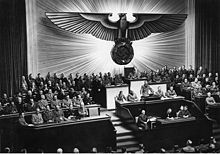

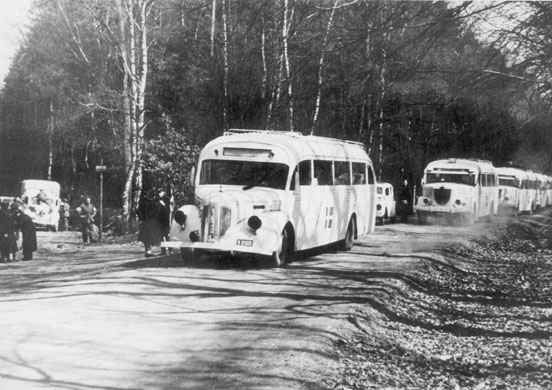
Magda Goebbels pens a farewell letter to her 24 year old son from her first marriage, Harald Quandt, a POW held in North Africa; the only one of her children who will survive her:

My beloved son! By now we have been in the Fuehrerbunker for six days already—daddy, your six little siblings and I, for the sake of giving our national socialistic lives the only possible honorable end . . . . You shall know that I stayed here against daddy's will, and that even on last Sunday the Fuehrer wanted to help me to get out. You know your mother—we have the same blood, for me there was no wavering. Our glorious idea is ruined and with it everything beautiful and marvelous that I have known in my life. The world that comes after the Fuehrer and national socialism is not any longer worth living in and therefore I took the children with me, for they are too good for the life that would follow, and a merciful God will understand me when I will give them the salvation . . . .
The children are wonderful . . . there never is a word of complaint nor crying. The impacts are shaking the bunker. The elder kids cover the younger ones, their presence is a blessing and they are making the Fuehrer smile once in a while. May God help that I have the strength to perform the last and hardest. We only have one goal left: loyalty to the Fuehrer even in death. Harald, my dear son—I want to give you what I learned in life: be loyal! Loyal to yourself, loyal to the people and loyal to your country ... Be proud of us and try to keep us in dear memory.
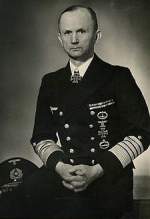
Grand Admiral Karl Doenitz—believing that Himmler will soon succeed Hitler—contacts the SS leader and assures him that he has his support. Doenitz asks the Reichsfuehrer SS about rumors of Himmler's negotiations of surrender terms with the West. Himmler denies that there is anything to the rumors. (Shirer)
From Himmler by Roger Manvell and Heinrich Fraenkel:While Schellenberg was during the morning of 28 April successfully calming Himmler with the aid of his favorite astrologer, the Allied press was pouring out the news of the Reichsfuehrer's independent attempt at negotiations. Completely unaware of this, Himmler attended a military conference in Rheinsberg convened by Keitel. At this meeting Himmler presided, which showed that he regarded himself as Hitler's deputy and successor. In the late afternoon Bernadotte heard the news of the negotiations on the clandestine radio, and realized that Himmler was finished as a negotiator.
Doenitz also heard the report and telephoned inquiries to Himmler, who immediately denied the story as it had been put in the broadcast, but added that he had no intention of issuing any public statement himself. According to Schellenberg, he then spent part of the day deciding how best to order the evacuation of German troops from Norway and Denmark. It was not until nine o'clock that night that a monitor report on a broadcast put out by the BBC gave Himmler away to the Fuehrer in the bowels of the Bunker. According to one observer, Hitler's 'color rose to a heated red, and his face became virtually unrecognizable.' Then he began to rage at this treacherous betrayal by the man he had trusted most of all. The men and women hemmed in the Bunker were convulsed with emotion, and 'everyone looked to their poison.'

Himmler: Sometime between 7 and 9 PM, a BBC report picked up in the Fuehrerbunker announces that Himmler has just offered to surrender Germany unconditionally to the Allies. Rochus Misch, the switchboard officer on duty in the Fuehrerbunker, will later tell Gitta Sereny:
He (Hitler) was sitting on that bench outside my switchboard room with a puppy in his lap when Lorenz, whom I heard arrive at a run, handed him the paper on which he had jotted down the radio dispatch. Hitler's face went completely white, almost ashen. 'My God,' I thought, 'he is going to faint.' He slumped forward holding his head with his hands. The puppy plumped to the ground - silly how one remembers such trifles, but I can still here that soft sound.
Enraged at Himmler's duplicity, Hitler rants uncontrollably about this new betrayal, then closets himself in a conference room with Bormann and Goebbels. He first orders that Otto Hermann Fegelein, Himmler's man at the Bunker, be arrested. He then orders Field Marshal von Greim and Hanna Reitsch to fly to Doenitz's headquarters at Ploen and arrest Himmler. 'A traitor must never succeed me as Fuehrer,' he screams. 'You must get out (of Berlin) to make sure he doesn't.' (Read, Sereny)
SS-Obergruppenfuehrer Hans Georg Otto Hermann Fegelein—the brother-in-law of Eva Braun and also Himmler's liaison officer in the bunker—is arrested in civilian clothes while preparing to leave the country. He is brought back to Hitler's bunker, but is temporarily saved by Eva's pleas for mercy on behalf of her pregnant sister. The reprieve proves short-lived as Hitler soon becomes convinced that Fegelein's escape attempt is part of Himmler's treachery. Within an hour Fegelein is tried, sentenced to death, taken up to the Reich Chancellery Garden, and executed with a bullet in the back of his head. (Read)
Robert Ritter von Greim, and Hanna Reitsch take their final leave of the Fuehrerbunker.
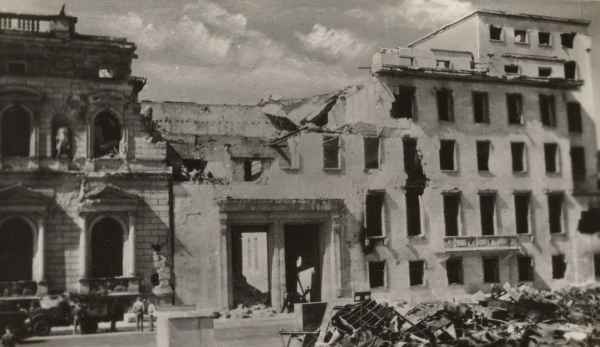
Martin Bormann wires Admiral Doenitz: "Reich Chancellery (Reichskanzlei) a heap of rubble." He informs Keitel that the foreign press is reporting fresh acts of treason and 'that without exception Schoerner, Wenck and the others must give evidence of their loyalty by the quickest relief of the Fuehrer.
Battle For Berlin:
The bridge on the Potsdamerstrasse was seized on the 28th and in the face of fierce opposition from the SS 'Anhalt' Regiment, the attack began on the Tiergarten (Zoo). Maj Gen S. I. Perevertkin prepared his 79th Rifle Corps (comprising the 150th, 171st and 207th Rifle Divisions) to storm the Reichstag, but first the Soviets would have to overcome some serious obstacles. In front of the Reichstag lay Koenigsplatz, across which there lay a water-filled antitank ditch and behind this numerous gun pits, artillery emplacements and trenches connected to the Reichstag itself. Additional mortars and artillery pieces were sited in the Tiergarten and the whole area was mined. As with every other building in the area, the Reichstag itself had been heavily fortified with the lower storeys being reinforced with steel rails and concrete and the doors and windows bricked up to provide loopholes. It also had street-level cellar windows, which proved to be natural gun embrasures and the construction site for the abandoned U-Bahn (Underground) tunnel nearby was readily incorporated into the defense system. The area was defended by between 5 and 6,000 German troops of all kinds, including Army regulars, SS, Allgemeine-SS (defending the Ministry of the Interior), Volkssturm and 250 sailors from the 'Grossadmiral Doenitz' Naval Battalion, reinforced with large numbers of stragglers and some tanks from the 11th 'Herman von Salza' Tank Battalion, the majority of whom were in the Reichstag itself. [For further details, Click here.]
Death: "Il Duce," Benito Mussolini and his mistress, Clara Petacci:

The 61-year-old deposed former dictator of Italy was established by his German allies as the figurehead of a puppet government in northern Italy during the German occupation toward the close of the war. As the Allies fought their way up the Italian peninsula, defeat of the Axis powers all but certain, Mussolini considered his options. Not wanting to fall into the hands of either the British or the Americans, and knowing that the communist partisans, who had been fighting the remnants of roving Italian fascist soldiers and thugs in the north, would try him as a war criminal, he settled on escape to a neutral country.
He and his mistress made it to the Swiss border, only to discover that the guards had crossed over to the partisan side. Knowing they would not let him pass, he disguised himself in a Luftwaffe coat and helmet, hoping to slip into Austria with some German soldiers. His subterfuge proved incompetent, and he and Petacci were discovered by partisans and shot, their bodies then transported by truck to Milan, where they were hung upside down and displayed publicly for revilement by the masses. (History.com)
1952 Far East: Japan and China signed the Treaty of Taipei to officially end the Second Sino-Japanese War, seven years after fighting in that conflict ended due to World War II. [For further information, click here.]
1969 De Gaulle resigns as leader of France:
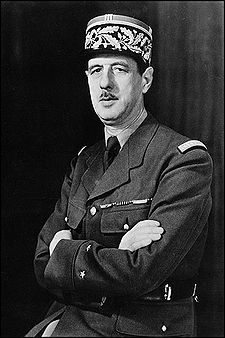
Following the defeat of his proposals for constitutional reform in a national referendum, Charles de Gaulle resigns as president of France.
A veteran of World War I, de Gaulle unsuccessfully petitioned his country to modernize its armed forces between the wars. After Henri Petain and other French leaders signed an armistice with Nazi Germany in June 1940, he fled to London, where he organized the Free French forces and rallied French colonies to the Allied cause. His forces fought successfully in North Africa, and in June 1944 he was named head of the French government in exile. On August 26, following the Allied invasion of France, de Gaulle entered Paris in triumph. Three months later, he was unanimously elected provisional president of France.
He resigned in January 1946, however, claiming he lacked sufficient governing power. De Gaulle formed a new political party that had only moderate electoral success, and in 1953 he retired. However, five years later, a military and civilian revolt in Algeria created a political crisis in France, and he was called out of retirement to lead the nation. A new constitution was passed, and in late December he was elected president of the Fifth Republic.
During the next decade, President de Gaulle granted independence to Algeria and attempted to restore France to its former international stature by withdrawing from the U.S.-dominated NATO alliance and promoting the development of French atomic weapons. However, student demonstrations and workers' strikes in 1968 eroded his popular support, and in 1969 his proposals for further constitutional reform were defeated in a national vote. On April 28, 1969, Charles de Gaulle, 79 years old, retired for good. He died the following year. (History.com)
1977 Red Army Faction trial ends:
In Stuttgart, West Germany, the lengthy trial of the leaders of the terrorist Baader-Meinhof Gang, also known as the Red Army Faction, ends with Andreas Baader, Gudrun Ensslin, and Jan-Carl Raspe being found guilty of four counts of murder and more than 30 counts of attempted murder. Each defendant was sentenced to life imprisonment, Germany's most severe punishment. [For further details, Click here.]
Edited by Levi Bookin (Copy editor)
levi.bookin@gmail.com



Click to join 3rdReichStudies







Please note that the list-owner and the moderator are not responsible for, and do not necessarily approve of, the random ads placed on our pages by our web server. They are, unfortunately, the price one pays for a 'free' website.
FAIR USE NOTICE: This site may contain copyrighted material the use of which has not always been specifically authorized by the copyright owner. We are making such material available in our efforts to advance understanding of historical, political, human rights, economic, democracy, scientific, environmental, and social justice issues, etc. We believe this constitutes a 'fair use' of any such copyrighted material as provided for in section 107 of the US Copyright Law. In accordance with Title 17 U.S.C. Section 107, the material on this site is distributed without profit to those who have expressed a prior interest in receiving the included information for research and educational purposes. If you wish to use copyrighted material from this site for purposes of your own that go beyond 'fair use', you must obtain permission from the copyright owner.